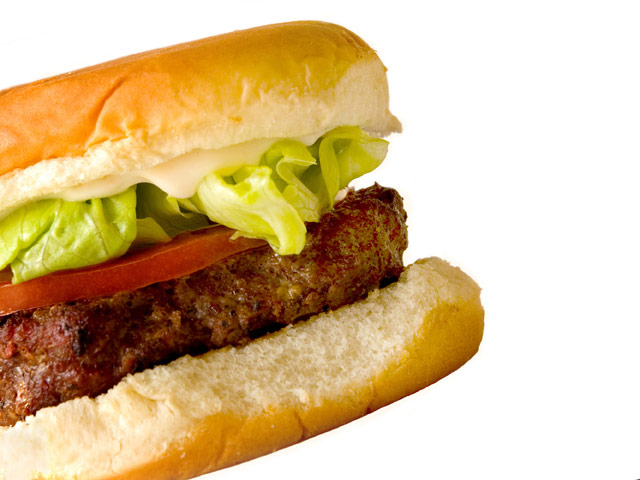The Recession Could Make You Fat

Studies have shown that obesity and income are related. One reason: Poor neighborhoods tend to have more fast food restaurants and fewer grocery stores, so it's harder for residents to eat well.
"In Seattle we have found that there are fivefold differences in obesity rates depending on the zip code — the low-income zip codes have a much higher proportion of obese people," Adam Drewnowski, the director of the Nutrition Sciences Program at the University of Washington, tells Reuters.
Now some experts fear the recession could cause more U.S. residents to gain weight as they cut corners on food purchases. Who can resist a 99-cent burger? Thing is, cheaper foods are often loaded with saturated fat and sugar.
"Things are going to get worse," Drewnowski said. "Obesity is a toxic result of a failing economic environment."
One glaring sign: McDonald's is busy, while the upscale and health-conscious grocer Whole Foods is struggling, Reuters reports.
Being overweight is nowadays passed off by many people as no big deal. But obesity is a prime cause of serious health problems, including diabetes, heart problems and reduced sexual function. The costs are personal and society-wide, as the health care system is burdened with more and more diseases that could have been prevented through better eating.
In other news this week, researchers have found that if you eat poorly, you probably can't simply exercise your way to a thin physique. They found that obesity is caused mostly by poor diets. Exercise, long thought to be one way to battle the bulge, does not seem to have as much effect as diet. (Exercise remains a key to better health for many other reasons, from lowering risk of heart disease and some cancers to improving cognitive abilities.)
Sign up for the Live Science daily newsletter now
Get the world’s most fascinating discoveries delivered straight to your inbox.
To say cheap food is bad for you is not the whole picture, however. Smart shoppers can buy nutritional food without breaking the bank. Kathleen M. Zelman offers a host of tips at WebMD, including:
- Watch produce prices. Out-of-season produce can cost a fortune.
- Frozen vegetables are often cheaper than fresh, and they don't spoil.
- Consider the nutritional value of food and don't buy soda and other things that are bad for you anyway. Substitute fruit for sweets.
- Pack a lunch rather than buying it. A home-made sandwich is cheap, and if made on whole wheat bread, much more nutritious than the average burger.
- Non-meat protein sources such as beans, eggs and tofu cost less.
- Buy in bulk and cook in bulk, then freeze portions.
Zelman also suggests planning meals and making a list before you shop so you don't overbuy.
Robert Roy Britt is the Editorial Director of Imaginova. In this column, The Water Cooler, he takes a daily look at what people are talking about in the world of science and beyond.
Robert is an independent health and science journalist and writer based in Phoenix, Arizona. He is a former editor-in-chief of Live Science with over 20 years of experience as a reporter and editor. He has worked on websites such as Space.com and Tom's Guide, and is a contributor on Medium, covering how we age and how to optimize the mind and body through time. He has a journalism degree from Humboldt State University in California.










